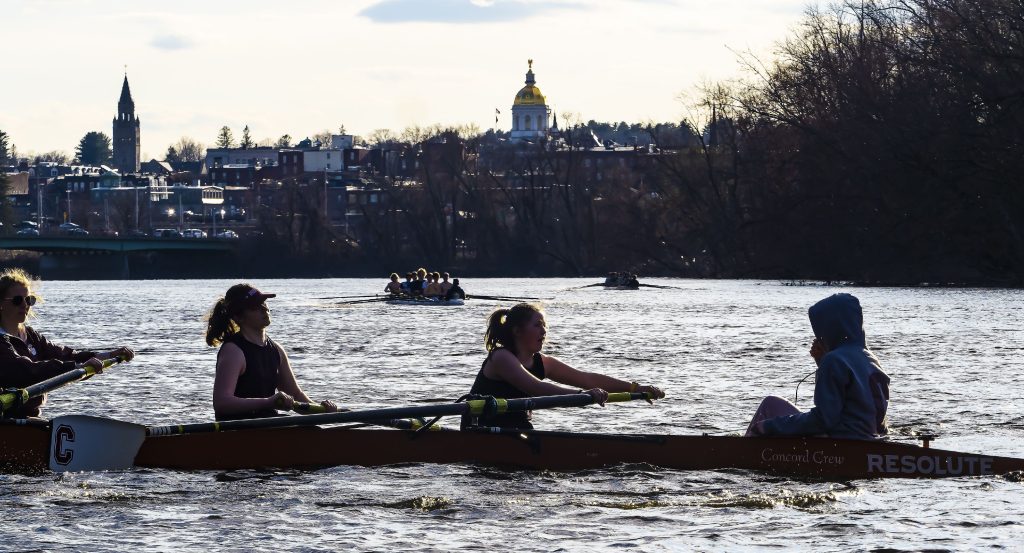Dec. 21, 1833: Benjamin Brown French of Chester, who will serve for many years in Washington, D.C., arrives there for his first job as a clerk in the U.S. House. He writes: “I entered the Capitol today, for the first time, and I viewed it with thoughts and emotions which I cannot express – will it always be the capitol of my happy country?”
Dec. 22, 1840: Belknap County is established.
Dec. 23, 1999:The Monitor reports that Gov. Jeanne Shaheen is joining the fight against a nationwide order by President Clinton that could limit logging in the White Mountain National Forest. “I believe the proposal sets a terrible precedent for the governance of our national forests,” Shaheen says.
Dec. 24, 2001: For years, New Hampshire has lagged behind other states in compiling the crime statistics that can affect federal funds, local police efforts and legislative spending, the Monitor reports. A recent push by the state attorney general’s office has increased the number of local departments recording and reporting crimes, but some say New Hampshire still has a ways to go.
Dec. 24, 1999: Wolfeboro Falls Postmaster Laura Cronin reports that her annual work as Santa’s secretary is going well. The job entails showing the letters to Santa and then sending them back to parents in case they like to keep scrapbooks. A few days later, she also mails all of Santa’s replies.
Dec. 24, 1828: The town of Franklin is incorporated. It includes land formerly part of Salisbury, Andover, Sanbornton and Northfield.
Dec. 25, 1820: Episcopalians hold Concord’s first Christmas celebration 93 years after the town was settled. Because Concord was settled by Massachusetts Congregationalists, the holiday was previously banned.
Dec. 25, 1776: Gen. George Washington informs Col. John Stark of New Hampshire that Stark will lead one of the elements in a surprise attack on British forces at Trenton, N.J.
Dec. 26, 2002: The first snowflakes that lined door wreaths and lights Christmas morning were just a harbinger of what was to come, the Monitor reports. By the early afternoon, snow fell in sheets, with up to 20 inches predicted accumulation across the state.
Dec. 26, 2001: A fire tears through a two-story house on Lyndon Street, leaving three people homeless. No one was injured.
Dec. 26, 1999: Proclaiming that “the cause of gay rights, like women’s rights, is a just one,” a Monitor editorial predicts: “Eventually, when it has led to its logical conclusion, the wonder will be why it took so long to get there.” A week earlier, the Vermont Supreme Court set off a furor with its ruling that gay and lesbian couples are entitled to the same legal standing as married people.
Dec. 26, 1774: Royal Gov. John Wentworth issues a proclamation of rebellion calling for the imprisonment of dissidents against royal decrees and asking colonists to identify those involved in recent uprisings. The proclamation will be ignored.
Dec. 26, 1856: A fire reduces Concord’s Phenix Hotel to ashes. It will rise again on the same spot.
Dec. 26, 1987: A Monitor poll of city councilors gives Liz Hager the edge in a three-way vote for mayor of Concord. She will eventually defeat Jim MacKay – with the help of candidate Bob Washburn – becoming the city’s first female mayor.
Dec. 26, 1776: Col. John Stark’s troops lead the attack on the British and Hessians at Trenton. Capt. Joshua Abbot’s Concord company and Ebenezer Frye’s Pembroke company march with Stark. Frye, “being very corpulent,” tires quickly and tells his men to move ahead “as fast as they please” under Sgt. Ephraim Stevens. The battle lasts 50 minutes. The Patriot victory is a turning point of the Revolution.
Dec. 26, 1900: The police foil a murder for hire in Concord. The hit man turns in the woman who offered him $10, her rings and a pair of opera glasses to kill her estranged husband. The woman, 26-year-old Carrie Sinclair Huntoon, is a Concord belle who can trace her ancestry to the Pilgrims. She will be found insane and committed to the asylum.
Dec. 27, 2002: Andrew McCrae’s lawyer tells a judge he will fight efforts to return McCrae to California, where the college sophomore has admitted to killing a police officer Nov. 19. McCrae, who legally changed his name from Andrew Mickel, was arrested Nov. 26 in a Concord hotel room after insisting on being allowed to tell a reporter why he had ambushed and shot Officer David Mobilio three times. He said he was protesting police brutality and corporate irresponsibility.









